| |||||
| Decades: | |||||
|---|---|---|---|---|---|
| See also: | |||||
1954 in Algeria:
| |||||
| Decades: | |||||
|---|---|---|---|---|---|
| See also: | |||||
1954 in Algeria:

Algeria, officially the People's Democratic Republic of Algeria, is a country in the Maghreb region of North Africa. It is bordered to the northeast by Tunisia; to the east by Libya; to the southeast by Niger; to the southwest by Mali, Mauritania, and Western Sahara; to the west by Morocco; and to the north by the Mediterranean Sea. Algeria has a semi-arid climate, with the Sahara desert dominating most of the territory except for its fertile and mountainous north, where most of the population is concentrated. Spanning 2,381,741 square kilometres (919,595 sq mi), it is the world's tenth-largest nation by area, and the largest nation in Africa. With a population of 44 million, Algeria is the tenth-most populous country in Africa, and the 32nd-most populous country in the world. The capital and largest city is Algiers, located in the far north on the Mediterranean coast.

Albert Camus was a French philosopher, author, dramatist, journalist, world federalist, and political activist. He was the recipient of the 1957 Nobel Prize in Literature at the age of 44, the second-youngest recipient in history. His works include The Stranger, The Plague, The Myth of Sisyphus, The Fall and The Rebel.
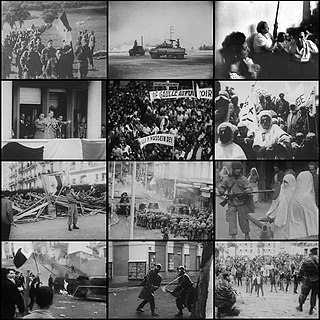
The Algerian War was a major armed conflict between France and the Algerian National Liberation Front (FLN) from 1954 to 1962, which led to Algeria winning its independence from France. An important decolonization war, it was a complex conflict characterized by guerrilla warfare and war crimes. The conflict also became a civil war between the different communities and within the communities. The war took place mainly on the territory of Algeria, with repercussions in metropolitan France.

Oran is a major coastal city located in the northwest of Algeria. It is considered the second most important city of Algeria, after the capital, Algiers, because of its population and commercial, industrial and cultural importance. It is 432 km (268 mi) west-southwest from Algiers. The total population of the city was 803,329 in 2008, while the metropolitan area has a population of approximately 1,500,000, making it the second-largest city in Algeria.

French Algeria, also known as Colonial Algeria, was the period of Algerian history when the country was a colony and later an integral part of France.
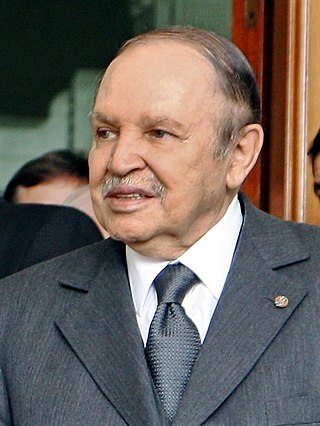
Abdelaziz Bouteflika was an Algerian politician and diplomat who served as the seventh president of Algeria from 1999 to his resignation in 2019.

The Algeria national football team represents Algeria in men's international football, and is governed by the Algerian Football Federation. The team plays their home matches at the 5 July Stadium in Algiers and Miloud Hadefi Stadium in Oran. Algeria joined FIFA on 1 January 1964, a year and a half after gaining independence. They are the current champions of the FIFA Arab Cup.

The Algerian Civil War, known in Algeria as the Black Decade, was a civil war fought between the Algerian government and various Islamist rebel groups from 11 January 1992 to 8 February 2002. The war began slowly, as it initially appeared the government had successfully crushed the Islamist movement, but armed groups emerged to declare jihad and by 1994, violence had reached such a level that it appeared the government might not be able to withstand it. By 1996–97, it had become clear that the Islamist resistance had lost its popular support, although fighting continued for several years after.

The Paris massacre of 1961 was the mass killing of Algerians who were living in Paris by the French National Police. It occurred on 17 October 1961, during the Algerian War (1954–62). Under orders from the head of the Parisian police, Maurice Papon, the National Police attacked a demonstration by 30,000 pro-National Liberation Front (FLN) Algerians. After 37 years of denial and censorship of the press, in 1998 the government finally acknowledged 40 deaths, while some historians estimate that between 200 and 300 Algerians died. Death was due to heavy-handed beating by the police, as well as mass drownings, as police officers threw demonstrators into the river Seine.
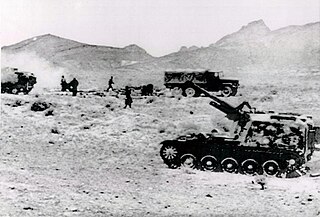
The Sand War was a border conflict between Algeria and Morocco fought from September 25 to October 30, 1963, although a formal peace treaty was not signed until February 20, 1964. It resulted largely from the Moroccan government's claim to portions of Algeria's Tindouf and Béchar provinces. The Sand War led to heightened tensions between the two countries for several decades.

Mouloudia Club d'Alger, referred to as MC Alger or MCA for short, is an Algerian football club based in Algiers. The club was founded in 1921 and its colours are red, green and white. Their home stadium, Ali La Pointe Stadium, has a capacity of 40,000 spectators.The club is currently playing in the Algerian Ligue Professionnelle 1.
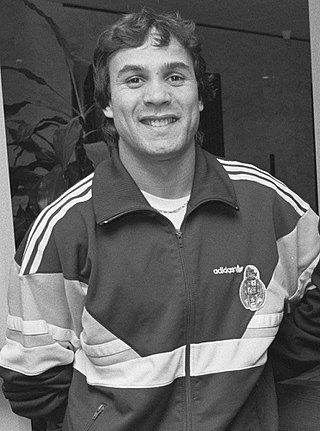
Rabah Mustapha Madjer is an Algerian former professional footballer who played as a striker.

Mouloudia Club of Oran, known as Mouloudia of Oran, commonly referred to as MC Oran for short, is an Algerian professional football club based in Oran. Founded on 1 January 1917 and formed again on 14 May 1946, the club was known as Mouloudia Chaâbia Ouahrania from 1971 to 1977, Mouloudia Pétroliers d'Oran from 1977 to 1987 and Mouloudia d'Oran from 1987 to 1989. The club colours are red and white. Their home stadium, Ahmed Zabana Stadium, has a capacity of 40,000 spectators. The club is currently playing in the Algerian Ligue Professionnelle 1.

Entente Sportive Sétifienne, known as Entente de Sétif, commonly referred to as ES Sétif or ESS for short, is an Algerian professional football club based in Sétif. The club was founded in 1958 and its colours are black and white. Their home stadium, the 8 May 1945 Stadium, has a capacity of 18,000 spectators. The club is currently playing in the Algerian Ligue Professionnelle 1.

Chabab Riadhi Belouizdad ; known as CR Belouizdad or simply CRB for short, is an Algerian association football club based in Algiers, Algeria, that plays in the Ligue Professionnelle 1, the top flight of Algerian football. The club has competed in the top division for a record 55 seasons.

Algeria first competed at the Olympic Games in 1964, and has participated in every Summer Olympic Games since then, except for the boycotted 1976 Summer Olympics. Algeria has also sent athletes to the Winter Olympic Games on three occasions. The National Olympic Committee for Algeria is the Comité Olympique Algérien, founded in 1963.

An Islamist insurgency is taking place in the Maghreb region of North Africa, followed on from the end of the Algerian Civil War in 2002. The Algerian militant group Salafist Group for Preaching and Combat (GSPC) allied itself with al-Qaeda to eventually become al-Qaeda in the Islamic Maghreb (AQIM). The Algerian and other Maghreb governments fighting the militants have worked with the United States and the United Kingdom since 2007, when Operation Enduring Freedom – Trans Sahara began.
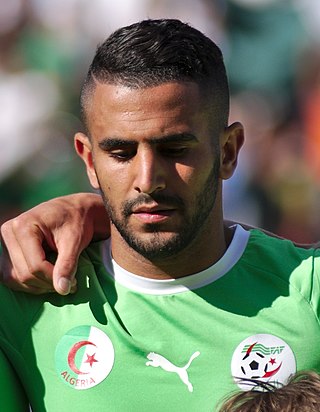
Riyad Karim Mahrez is a professional footballer who plays as a right winger for Saudi Pro League club Al-Ahli and captains the Algeria national team.

Abdelmadjid Tebboune is an Algerian politician currently serving as the President of Algeria since December 2019 and as Minister of Defence.
The COVID-19 pandemic in Algeria was a part of the worldwide pandemic of coronavirus disease 2019 caused by severe acute respiratory syndrome coronavirus 2. The virus was confirmed to have spread to Algeria in February 2020. In response, the Algerian government ordered curfews, restricted gatherings, canceled public events, and issued stay-at-home orders between February and June. Some measures were re-implemented in later months in response to new waves of infections. A mass vaccination campaign against COVID-19 began in January 2021. The pandemic disrupted anti-government protests, which largely halted in 2020 and resumed in 2021. 6,881 deaths were officially recorded by the Algerian government through 2022, although the World Health Organization estimated over 21,000 deaths had occurred through 2021.